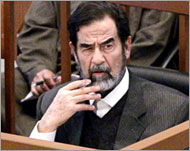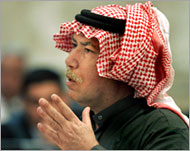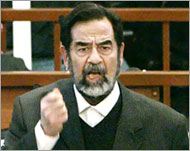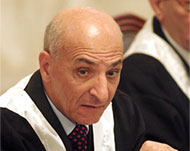Untitled Document
 |
|
Saddam could be hanged if found guilty
|
The chief judge in Saddam Hussein's trial has closed off the court
to journalists after the former president called on Iraqis "to resist the
invaders".
"I call on the people to start resisting the invaders instead of killing
each other," Saddam told the court on Wednesday.
But he urged Iraqis to avoid civil war, otherwise "you will live in darkness
and bloods of river".
Just before the media was turned out of the gallery and the cameras switched
off, Saddam told judge Rauf Abdel Rahman he had no right to interrupt him as
he had been appointed by American occupiers.
"You are charged with murder, stop your political speech," the judge
said.
Saddam - dressed in a black suit - read from a written statement in which he
insisted he was Iraq's elected president and began to address the Iraqi people
about the bloody wave of sectarian violence that has rocked the country since
the bombing of a major Shia shrine last month.
Saddam speech
"What pains me most is what I heard recently about something that aims
to harm our people," Saddam said. "My conscience tells me that the
great people of Iraq have nothing to do with these acts," he said referring
to the bombing of the shrine in the city of Samarra.
Abdel-Rahman interrupted saying he was not allowed to give political speeches
in the court.
"I am the head of state," Saddam replied.
"You used to be a head of state. You are a defendant now," Abdel-Rahman
said.
As Saddam continued reading from a prepared text, the judge repeatedly closed
his microphone to prevent his words from being heard and told him to address
the charges against him. Saddam ignored the judge and continued speaking.
He went on with his speech, urging Iraqis not fight each other. He praised the
insurgency, saying, "In my eyes, you are the resistance to the American
invasion".
"You are being tried in a criminal case for killing innocent people, not
because of your conflict with America," Abdel-Rahman told him.
"What about the innocent people who are dying in Baghdad? I am talking
to the Iraqi people," Saddam replied.
Saddam was the last of the case's eight defendants to testify. Though he has
spoken frequently since the trial began in October, Wednesday's session was
to be the first chance for the judge and prosecutors to directly question him.
Barzan testimony
 |
|
Barzan denied any role in the
al-Dujail killings
|
Earlier during the day, Barzan Ibrahim, Saddam's half-brother and former intelligence
chief, said he was brought to court because he refused a senior post in exchange
for his co-operation in overthrowing Hussein government.
Barzan told the judge that he was before him not because he had a role in al-Dujail
case, but because he refused an offer for a senior post in Iraq if he helped the
invasion.
"I refused to cooperate because I was afraid that people say I am thirsty
for power," Barzan said.
Barzan denied he took part in a crackdown against Shia members of al-Dawa party
who tried to assassinate Saddam in 1982.
Barazan testified for the first time in the trial of the former Iraqi leader
and members of his government.
The former Iraqi leader and his officials are charged with executing 148 Shia,
illegal imprisonment and torture, in a crackdown started after an assassination
attempt on Saddam in the Shia village of al-Dujail in 1982. They face possible
execution by hanging if convicted.
In previous sessions, purported al-Dujail residents have testified that Ibrahim
participated in torturing them during their imprisonment at the Baghdad headquarters
of the intelligence agency, which Ibrahim led. One woman said Ibrahim kicked
her in the chest after her interrogators hung her naked upside down.
Ibrahim denied the allegation.
Saddam's motorcade
Ibrahim, wearing a traditional red scarf on his head, told chief judge Rauf
Abdel Rahman that he visited al-Dujail on the day of the 8 July 1982 shooting
attack on Saddam's motorcade and on the following day - but then "never
visited it again after that."
 |
|
Saddam was praised by Barzan
|
He said the General Security agency handled the investigation into the shooting,
not his own intelligence department.
He told the court he ordered the release of al-Dujail residents who had been
detained.
"I chided the security and party officials for detaining those people,
I shook their (the released detainees') hands and let them go.
"I did not order any detentions. I did not interrogate anyone," he
said, adding that he resigned as head of the intelligence in August 1983.
Right to respond
Reading from a statement, Ibrahim said Saddam's government had a right to respond
after the Iraqi leader came under attack "from a group supported by Iran
at a time when Iraq was at war with Iran," a reference to the Tehran-backed
Shia al-Dawa Party that carried out the shooting.
He praised Saddam, saying he "served this country for 25 years and achieved
historic accomplishments ... services, education. He is a true leader."
Ibrahim said he was badly treated after his arrest by US forces in April 2003.
He said that when he was captured, his American interrogators asked him "how
Osama bin Laden came to Iraq" and met Saddam. "They asked dozens of
such questions with imaginary bases and assumptions," he said.
He also said he had asked for the past two years for medical tests "but
no one has listened to me."
Repeated statement
Ibrahim has made such statements previously in court - but the testimony is
the first opportunity for the judge and prosecutors to directly question him.
 |
|
Judge Abdel Rahman has been
accused of acting tough
|
Earlier this week, six other defendants went through similar questioning, one
by one, and all insisted on their innocence.
One of the defendants, Awad al-Bandar - the former chief judge of the Revolutionary
Court - admitted on Monday that he sentenced the 148 Shia to death, but he maintained
they received a fair trial and had confessed to trying to assassinate the former
Iraqi president.
His comments echoed those of Saddam in an earlier session.
Last month, Saddam admitted in court that he ordered the 148 Shia to be put
on trial before the Iraqi Revolutionary Court, but said it was his right to
do so because they were suspected of trying to kill him, and he acted according
to his capacity as the president of the state.
Prosecutors are trying to show that Saddam's government had sought to punish
the town's civilian population. Hundreds of people were arrested - including
entire families, with women and young children - and detained for years, for
links to the Iraq Shia al-Dawa party who allied with Iran in its war with Iraq
1980-1988.

